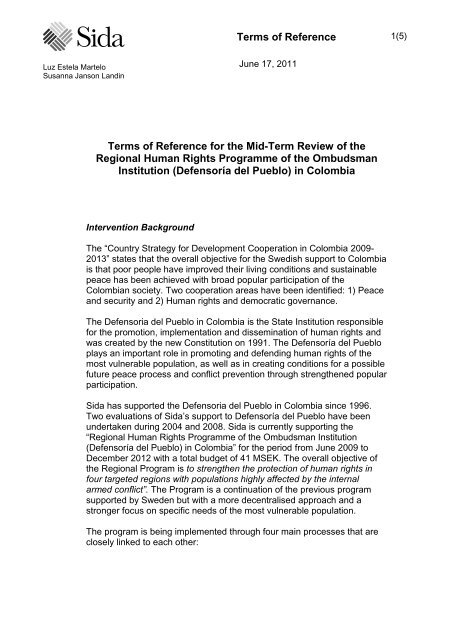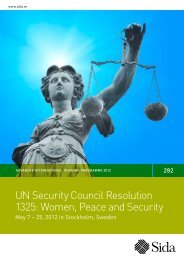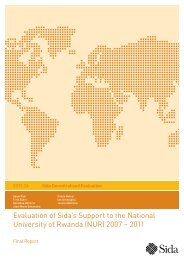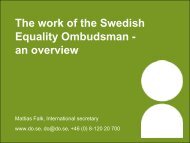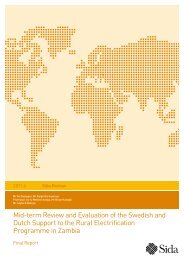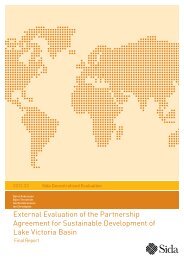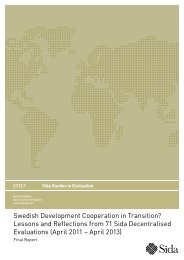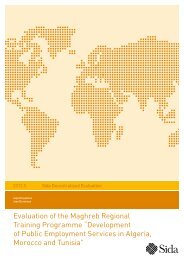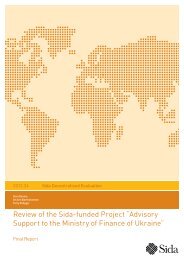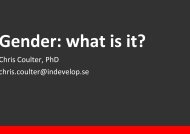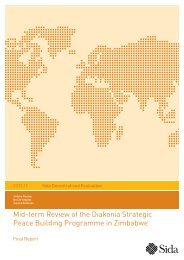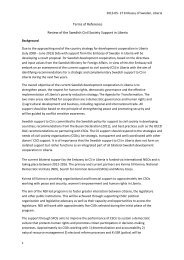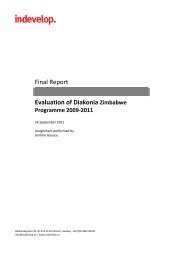Terms of Reference Terms of Reference for the Mid ... - Indevelop
Terms of Reference Terms of Reference for the Mid ... - Indevelop
Terms of Reference Terms of Reference for the Mid ... - Indevelop
You also want an ePaper? Increase the reach of your titles
YUMPU automatically turns print PDFs into web optimized ePapers that Google loves.
<strong>Terms</strong> <strong>of</strong> <strong>Reference</strong> 1(5)<br />
Luz Estela Martelo<br />
Susanna Janson Landin<br />
June 17, 2011<br />
<strong>Terms</strong> <strong>of</strong> <strong>Reference</strong> <strong>for</strong> <strong>the</strong> <strong>Mid</strong>-Term Review <strong>of</strong> <strong>the</strong><br />
Regional Human Rights Programme <strong>of</strong> <strong>the</strong> Ombudsman<br />
Institution (Defensoría del Pueblo) in Colombia<br />
Intervention Background<br />
The “Country Strategy <strong>for</strong> Development Cooperation in Colombia 2009-<br />
2013” states that <strong>the</strong> overall objective <strong>for</strong> <strong>the</strong> Swedish support to Colombia<br />
is that poor people have improved <strong>the</strong>ir living conditions and sustainable<br />
peace has been achieved with broad popular participation <strong>of</strong> <strong>the</strong><br />
Colombian society. Two cooperation areas have been identified: 1) Peace<br />
and security and 2) Human rights and democratic governance.<br />
The Defensoria del Pueblo in Colombia is <strong>the</strong> State Institution responsible<br />
<strong>for</strong> <strong>the</strong> promotion, implementation and dissemination <strong>of</strong> human rights and<br />
was created by <strong>the</strong> new Constitution on 1991. The Defensoría del Pueblo<br />
plays an important role in promoting and defending human rights <strong>of</strong> <strong>the</strong><br />
most vulnerable population, as well as in creating conditions <strong>for</strong> a possible<br />
future peace process and conflict prevention through streng<strong>the</strong>ned popular<br />
participation.<br />
Sida has supported <strong>the</strong> Defensoria del Pueblo in Colombia since 1996.<br />
Two evaluations <strong>of</strong> Sida’s support to Defensoría del Pueblo have been<br />
undertaken during 2004 and 2008. Sida is currently supporting <strong>the</strong><br />
“Regional Human Rights Programme <strong>of</strong> <strong>the</strong> Ombudsman Institution<br />
(Defensoría del Pueblo) in Colombia” <strong>for</strong> <strong>the</strong> period from June 2009 to<br />
December 2012 with a total budget <strong>of</strong> 41 MSEK. The overall objective <strong>of</strong><br />
<strong>the</strong> Regional Program is to streng<strong>the</strong>n <strong>the</strong> protection <strong>of</strong> human rights in<br />
four targeted regions with populations highly affected by <strong>the</strong> internal<br />
armed conflict”. The Program is a continuation <strong>of</strong> <strong>the</strong> previous program<br />
supported by Sweden but with a more decentralised approach and a<br />
stronger focus on specific needs <strong>of</strong> <strong>the</strong> most vulnerable population.<br />
The program is being implemented through four main processes that are<br />
closely linked to each o<strong>the</strong>r:
Sida 2 (5)<br />
<br />
<br />
<br />
<br />
Prevention, attention and protection – accompanying vulnerable<br />
population (displaced or in risk <strong>of</strong> displacement), facilitation <strong>of</strong> contacts<br />
with o<strong>the</strong>r public local and central authorities.<br />
Capacity development and human rights training to enhance popular<br />
participation in public policy development - support social mobilization<br />
and streng<strong>the</strong>ning <strong>of</strong> community based organizations, development <strong>of</strong><br />
training material adjusted to different regional contexts, development <strong>of</strong><br />
instruments to monitor public policies on prevention, attention and<br />
protection <strong>of</strong> human rights.<br />
Institutional streng<strong>the</strong>ning – develop a model <strong>for</strong> regular follow-up <strong>of</strong><br />
base-line study, implementation <strong>of</strong> new management in<strong>for</strong>mation<br />
system, streng<strong>the</strong>n planning mechanisms at regional level.<br />
Financial and administrative processes - support function ot <strong>the</strong> o<strong>the</strong>r<br />
processes, assure coherence between national and regional level.<br />
Stakeholders involvement<br />
The following institutions/entities are considered stakeholders in this<br />
evaluation: Sida, Defensoria del Pueblo (national and regional <strong>of</strong>fices),<br />
civil society organizations representing target groups, o<strong>the</strong>r governmental<br />
entities, multilateral and bilateral donors supporting <strong>the</strong> work <strong>of</strong> <strong>the</strong><br />
Defensoria del Pueblo.<br />
The entities within Defensoria del Pueblo involved in <strong>the</strong> Regional<br />
Programme should participate from <strong>the</strong> preparation phase <strong>of</strong> <strong>the</strong><br />
evaluation and throughout <strong>the</strong> evaluation and comment on draft reports.<br />
Defensoria del Pueblo and Sida shall submit all <strong>the</strong> necessary documents<br />
that <strong>the</strong> evaluation team needs and support <strong>the</strong> team in organising<br />
meetings with o<strong>the</strong>r stakeholders if requested by <strong>the</strong> consultants.<br />
Purpose <strong>of</strong> <strong>Mid</strong>-Term Review<br />
The purpose <strong>of</strong> <strong>the</strong> mid-term review <strong>of</strong> <strong>the</strong> Regional Human Rights<br />
Program <strong>of</strong> <strong>the</strong> Ombudsman Institution in Colombia 2009-2012, is to<br />
assess <strong>the</strong> implementation <strong>of</strong> <strong>the</strong> Program from June 2009 to July 2011.<br />
The evaluation will:<br />
- Analyze <strong>the</strong> progress towards <strong>the</strong> expected results<br />
- Analyze if <strong>the</strong> Program is consistent with <strong>the</strong> needs and priorities <strong>of</strong> <strong>the</strong><br />
women and men <strong>of</strong> <strong>the</strong> target groups.<br />
- Follow-up on recommendations from evaluation 2008 and Sida´s key<br />
issues during Agreement phase (established in contribution<br />
Agreement)<br />
- Identify lessons learned which could be useful <strong>for</strong> <strong>the</strong> Program<br />
- Make recommendations based on findings to improve <strong>the</strong><br />
implementation <strong>of</strong> <strong>the</strong> program.
Sida 3 (5)<br />
Review Questions<br />
The review should have a gender and rights perspective. The following<br />
areas and questions shall be analysed by <strong>the</strong> evaluation and reflected in<br />
<strong>the</strong> final report.<br />
Effectiveness (<strong>the</strong> extent to which development intervention has achieved<br />
its objectives, taking <strong>the</strong>ir relative importance into account)<br />
What advances has <strong>the</strong> program made in terms <strong>of</strong> <strong>the</strong> expected<br />
results within <strong>the</strong> four processes? What are <strong>the</strong> main strengths and<br />
weaknesses?<br />
Are <strong>the</strong> activities strategically oriented to reach <strong>the</strong> objectives <strong>of</strong> <strong>the</strong><br />
program?<br />
What issues could be streng<strong>the</strong>ned to make <strong>the</strong> intervention more<br />
effective?<br />
Are <strong>the</strong>re any unintended short and medium term results <strong>of</strong> <strong>the</strong><br />
programme?<br />
Analyse how <strong>the</strong> Defensoría is working with results based<br />
management (central-regional level)<br />
Relevance (<strong>the</strong> extent to which a development intervention con<strong>for</strong>ms to<br />
<strong>the</strong> needs and priorities <strong>of</strong> target groups and <strong>the</strong> policies <strong>of</strong> recipient<br />
countries and donors)<br />
Is <strong>the</strong> Regional Program consistent with <strong>the</strong> needs, priorities and<br />
living conditions <strong>of</strong> men and women <strong>of</strong> <strong>the</strong> target groups?<br />
Analyse <strong>the</strong> effects <strong>of</strong> <strong>the</strong> streng<strong>the</strong>ned territorial approach.<br />
Analyse <strong>the</strong> institutional capacity <strong>of</strong> <strong>the</strong> Defensoria to implement <strong>the</strong><br />
Program<br />
Is <strong>the</strong> Regional Program well in tune with <strong>the</strong> development policies,<br />
<strong>of</strong> <strong>the</strong> Colombian Government and <strong>the</strong> Defensoría del Pueblo at<br />
both national and regional level?<br />
Is <strong>the</strong> Regional Program consistent and complementary with o<strong>the</strong>r<br />
activities within <strong>the</strong> Defensoría del Pueblo supported by o<strong>the</strong>r<br />
donors?<br />
Analyse <strong>the</strong> integration <strong>of</strong> gender equality at strategic level as well<br />
as in <strong>the</strong> operations including special activities to promote women’s<br />
rights.<br />
Sustainability (<strong>the</strong> continuation or longevity <strong>of</strong> benefits from a<br />
development intervention after <strong>the</strong> cessation <strong>of</strong> development assistance)<br />
To what extent do Colombian stakeholders participate in <strong>the</strong><br />
planning and implementation <strong>of</strong> <strong>the</strong> program?<br />
Is <strong>the</strong> Defensoría del Pueblo (nationally and regionally)<br />
characterized by good-governance, including effective management<br />
and organisation?<br />
How has <strong>the</strong> budget distribution between headquarter and <strong>the</strong><br />
regions developed during <strong>the</strong> implementation phase?
Sida 4 (5)<br />
<br />
<br />
Does <strong>the</strong> Defensoría del Pueblo and <strong>the</strong> Colombian State have <strong>the</strong><br />
financial capacity to maintain <strong>the</strong> benefits from <strong>the</strong> Regional<br />
Program when donor support has been withdrawn?<br />
What ef<strong>for</strong>ts have been made to improve donor coordination and<br />
harmonisation<br />
Efficiency (<strong>the</strong> extent to which <strong>the</strong> costs <strong>of</strong> a development intervention<br />
can be justified by its results, talking alternatives into account)<br />
Has <strong>the</strong> Regional Program been managed with reasonable regard<br />
<strong>for</strong> efficiency? What measures have been taken during planning<br />
and implementation to ensure that resources are efficiently used?<br />
Could more <strong>of</strong> <strong>the</strong> same results have been achieved with <strong>the</strong> same<br />
resources?<br />
What improvement have been made regarding <strong>the</strong> internal<br />
coordination and institutionalisation <strong>of</strong> <strong>the</strong> program<br />
Assess <strong>the</strong> system <strong>for</strong> planning, monitoring and evaluation including<br />
<strong>the</strong> link to <strong>the</strong> base line study.<br />
Recommendations and lessons<br />
The evaluation shall provide Sida and <strong>the</strong> Defensoría del Pueblo with<br />
recommendations on necessary changes to be made to improve <strong>the</strong><br />
implementation <strong>of</strong> <strong>the</strong> program, as well as lessons learnt which could be<br />
useful to reach <strong>the</strong> objectives <strong>of</strong> <strong>the</strong> program.<br />
Methodology, Evaluation team and Schedule<br />
A team <strong>of</strong> 2 consultants should carry out <strong>the</strong> evaluation.<br />
The team must have:<br />
Documented experience <strong>of</strong> evaluation work <strong>of</strong> development<br />
cooperation programs<br />
Documented experience <strong>of</strong> working with human rights, gender<br />
equality and democratic governance<br />
Good knowledge <strong>of</strong> administration, organisation and follow-up <strong>of</strong><br />
implementing initiatives within <strong>the</strong> area <strong>of</strong> Ombudsmen Institutions<br />
Documented knowledge <strong>of</strong> <strong>the</strong> political and social situation in<br />
Colombia<br />
Previous experience <strong>of</strong> working with a Results Based Management<br />
Approach (RBM)<br />
Very good knowledge in Spanish and English<br />
Documented experience <strong>of</strong> drafting reports, carrying out interviews<br />
with stakeholders, facilitating stakeholders participation, and being<br />
able to effectively present evaluation results to diverse audiences.<br />
Should have <strong>the</strong> organisational skills necessary <strong>for</strong> planning and<br />
managing an evaluation process involving many people.<br />
The team leader should have previous experience <strong>of</strong> team leading.
Sida 5 (5)<br />
The tender shall explain how <strong>the</strong> skills and experiences <strong>of</strong> <strong>the</strong> team match<br />
<strong>the</strong> requirements <strong>of</strong> <strong>the</strong> list above.<br />
The consultants shall present in <strong>the</strong> tender a proposal <strong>of</strong> a work plan with<br />
a clear description <strong>of</strong> methodology, time-frame and budget. The<br />
assignment includes field visits to at least two regions.<br />
The mid-term review shall be carried out during 8 weeks during September<br />
and October 2011. The evaluation shall be realised in a participatory way.<br />
The draft report shall be discussed with Sida and <strong>the</strong> Defensoría del<br />
Pueblo.<br />
Reporting and Output<br />
<br />
<br />
<br />
<br />
<br />
The report shall be written in Spanish<br />
A draft report shall be submitted to Sida electronically no later than<br />
XXX.<br />
Within 1 week after receiving Sida’s comments on <strong>the</strong> draft report, a<br />
second draft report shall be submitted to Sida <strong>for</strong> its approval.<br />
Upon <strong>the</strong> second draft’s approval a final report shall be submitted<br />
to Sida, electronically and in 2 hardcopies (air-/surface mailed or<br />
delivered). The final report shall be written in SPANISH with an<br />
executive summary in English and should not exceed 30 pages,<br />
excluding annexes.<br />
The conclusions and main findings <strong>of</strong> <strong>the</strong> mid-term review shall be<br />
presented to <strong>the</strong> involved stakeholders (national stakeholders,<br />
relevant donors). The consultants are responsible <strong>for</strong> preparing and<br />
realising <strong>the</strong> seminar as well as and presenting a summary <strong>of</strong><br />
conclusions from <strong>the</strong> seminar to Sida.<br />
Annex:<br />
1. Program Document<br />
2. Sida decision<br />
3. Agreement + Amendment to agreement<br />
4. Evaluation 2008


